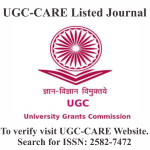EDWARD SOJA'S THIRD SPACE THEORY IN WILLIAM SHAKESPEARE'S AS YOU LIKE IT
DOI:
https://doi.org/10.29121/shodhkosh.v5.i5.2024.2027Keywords:
Edward Soja, Third Space Theory, William Shakespeare, As You Like It, Forest of Arden, Spatial Dynamics, Identity Transformation, Social Relations, Liminality, HybridityAbstract [English]
The application of Edward Soja's Third Space Theory to William Shakespeare's pastoral comedy "As You Like It." Third Space Theory, which emphasizes the intersection of physical, social, and imagined spaces, provides a novel lens through which to analyse the spatial dynamics within the play. By examining the Forest of Arden as a 'Third Space,' this study reveals how characters navigate and negotiate their identities and social relations beyond the constraints of the court. The fluid and hybrid nature of the Forest facilitates a transformative experience for the characters, enabling them to reconfigure their social roles and personal identities. This paper argues that Shakespeare's depiction of Arden serves as a critical commentary on the possibilities of social reformation and personal liberation within an alternative spatial framework. Through a close reading of key scenes, the analysis highlights how the play's spatial politics reflect and challenge contemporary notions of space, identity, and power.
References
Soja, Edward W. Third space: Journeys to Los Angeles and Other Real-and-Imagined Places. Blackwell Publishers, 1996. Shakespeare, William. As You Like It. Edited by H.J. Oliver, Oxford University Press, 1993.
Shakespeare, William. As You Like It. Edited by H.J. Oliver, Oxford University Press, 1993.
West-Pavlov, Russell. "Shakespearean Space in Contemporary Critical Theory." Shakespeare Survey, vol. 68, 2015, pp. 254-266.
Bachelard, Gaston. The Poetics of Space. Beacon Press, 1994.
Eagleton, Terry. The Ideology of the Aesthetic. Blackwell, 1990.
Friedman, Susan Stanford. "Women's Autobiographical Selves: Theory and Practice." Women's Studies: An Interdisciplinary Journal, vol. 15, no. 1, 1988, pp. 5-19.
Harrison, G.B. Forest of Arden in Drama: A Study of As You Like It. The University of Michigan Press, 1963.
Lynch, William F. "The Functions of the Forest of Arden in Shakespeare's As You Like It." Studies in Philology, vol. 50, no. 1, 1953, pp. 42-53.
Norbrook, David. Writing the English Republic: Poetry, Rhetoric and Politics, 1627-1660. Cambridge University Press, 1999.
Ogburn, Charlton. "Romantic Ideology and the Rural Tradition in As You Like It." Shakespeare Quarterly, vol. 38, no. 4, 1987, pp. 432-447.
Rutherford, Jonathan. The Third Space: Interview with Edward Soja. Sage Publications, 1996.
Smith, Neil. Uneven Development: Nature, Capital, and the Production of Space. Blackwell Publishers, 1984.
Tuan, Yi-Fu. Space and Place: The Perspective of Experience. University of Minnesota Press, 1977.
Zukin, Sharon. Landscapes of Power: From Detroit to Disney World. University of California Press, 1991. DOI: https://doi.org/10.1525/9780520913899
Bakhtin, Mikhail. The Dialogic Imagination: Four Essays. University of Texas Press, 1981.
Foucault, Michel. The Archaeology of Knowledge. Routledge, 2002.
Butler, Judith. Bodies That Matter: On the Discursive Limits of "Sex". Routledge, 1993.
Hall, Stuart. "Cultural Identity and Diaspora." Identity: Community, Culture, Difference, edited by Jonathan Rutherford, Lawrence & Wishart, 1990, pp. 222-237
Said, Edward W. Culture and Imperialism. Vintage Books, 1994.
Downloads
Published
How to Cite
Issue
Section
License
Copyright (c) 2024 Shruti Sharma

This work is licensed under a Creative Commons Attribution 4.0 International License.
With the licence CC-BY, authors retain the copyright, allowing anyone to download, reuse, re-print, modify, distribute, and/or copy their contribution. The work must be properly attributed to its author.
It is not necessary to ask for further permission from the author or journal board.
This journal provides immediate open access to its content on the principle that making research freely available to the public supports a greater global exchange of knowledge.




















